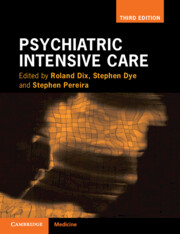Book contents
- Psychiatric Intensive Care
- Psychiatric Intensive Care
- Copyright page
- Contents
- Contributors
- Foreword
- Preface to the Third Edition
- Preface to the Second Edition
- Preface to the First Edition
- Acknowledgements
- Chapter 1 Psychiatric Intensive Care: Development and Definition
- Chapter 2 Psychiatric Intensive Care in Mental Health Secure Units
- Chapter 3 National Standards and Good Practice
- Chapter 4 Commissioning and Developing a PICU
- Chapter 5 PICU Design, Environment and Security
- Chapter 6 Team Resilience
- Chapter 7 Principles and Practice for Management of Acutely Disturbed Patients
- Chapter 8 Absconding
- Chapter 9 Substance Misuse
- Chapter 10 Fire-Setting and Arson
- Chapter 11 Sexually Problematic Behaviour in Mental Health Inpatient Units
- Chapter 12 Self-Harm and Personality Disorders in PICU
- Chapter 13 Activity and Positive Engagement within a PICU
- Chapter 14 De-escalation
- Chapter 15 Psychological Approaches to the Acute Patient in PICUs
- Chapter 16 A Social Behaviour Theory Approach to Challenging Behaviours in Psychosis
- Chapter 17 Pharmacological Therapy
- Chapter 18 Rapid Tranquillisation
- Chapter 19 The Use of Seclusion in Mental Health Care
- Chapter 20 The Practice of Restraint and Physical Intervention
- Chapter 21 Management of the Mental Health Emergency in the Community
- Chapter 22 PICU for the Care of Young People
- Chapter 23 Female-Only PICUs
- Chapter 24 The Complex Needs Patient
- Chapter 25 Psychiatric Intensive Care in General Hospital Settings
- Chapter 26 An Overview of International Perspectives on PICUs
- Index
- References
Chapter 2 - Psychiatric Intensive Care in Mental Health Secure Units
Published online by Cambridge University Press: 15 March 2024
- Psychiatric Intensive Care
- Psychiatric Intensive Care
- Copyright page
- Contents
- Contributors
- Foreword
- Preface to the Third Edition
- Preface to the Second Edition
- Preface to the First Edition
- Acknowledgements
- Chapter 1 Psychiatric Intensive Care: Development and Definition
- Chapter 2 Psychiatric Intensive Care in Mental Health Secure Units
- Chapter 3 National Standards and Good Practice
- Chapter 4 Commissioning and Developing a PICU
- Chapter 5 PICU Design, Environment and Security
- Chapter 6 Team Resilience
- Chapter 7 Principles and Practice for Management of Acutely Disturbed Patients
- Chapter 8 Absconding
- Chapter 9 Substance Misuse
- Chapter 10 Fire-Setting and Arson
- Chapter 11 Sexually Problematic Behaviour in Mental Health Inpatient Units
- Chapter 12 Self-Harm and Personality Disorders in PICU
- Chapter 13 Activity and Positive Engagement within a PICU
- Chapter 14 De-escalation
- Chapter 15 Psychological Approaches to the Acute Patient in PICUs
- Chapter 16 A Social Behaviour Theory Approach to Challenging Behaviours in Psychosis
- Chapter 17 Pharmacological Therapy
- Chapter 18 Rapid Tranquillisation
- Chapter 19 The Use of Seclusion in Mental Health Care
- Chapter 20 The Practice of Restraint and Physical Intervention
- Chapter 21 Management of the Mental Health Emergency in the Community
- Chapter 22 PICU for the Care of Young People
- Chapter 23 Female-Only PICUs
- Chapter 24 The Complex Needs Patient
- Chapter 25 Psychiatric Intensive Care in General Hospital Settings
- Chapter 26 An Overview of International Perspectives on PICUs
- Index
- References
Summary
Psychiatric inpatients who manifest challenging behaviour may require placement in an intensive or special care unit. This applies in both general and forensic psychiatry. Such units provide high levels of staff with low levels of interpersonal interaction with other patients and reduced stress. Levels of coercion are greater in these units and may involve the use of enforced medication, segregation, seclusion and physical and occasionally mechanical restraint. Much debate focuses on the ethics of such coercion. However, it is also necessary to consider the effects of not using such procedures on the health and safety of the patient and others. All methods of coercion have advantages and hazards. Methods vary across the world, and it is not self-evident which ones may be preferable ethically, with much being dependent on national and cultural tradition. Lengths of stay are much longer in forensic psychiatric hospitals, including in their intensive or special care units. Psychiatry is not alone in requiring such units; intensive care units are also needed in general medicine. Over the last year, general and forensic psychiatry and indeed general medicine have adapted to the impact of the COVID-19 pandemic with cases having been noted in forensic psychiatric hospitals and prisons.
- Type
- Chapter
- Information
- Psychiatric Intensive Care , pp. 19 - 37Publisher: Cambridge University PressPrint publication year: 2024

